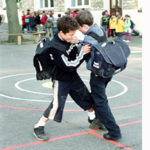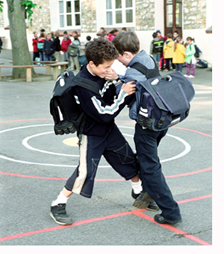 Once a student becomes a victim of a school crime, he or she becomes more aware of…
Once a student becomes a victim of a school crime, he or she becomes more aware of…
Once a student becomes a victim of a school crime, he or she becomes more aware of other potential criminal activity, becomes a victim of bullies, or is just generally fearful of a future attack. A recently released survey from the U.S. Department of Education’s National Center of Education Statistics included some interesting numbers about theft, gangs, drugs, and bullying on campus.
During the 2006-07 school year, just more than four percent of students ages 12-18 reported being a victim of any crime–theft, violent victimization, or serious violent victimization–at school.
Nearly four of 10 of those students reported the presence of gangs on campus, as opposed to just over one in five non-victims. Nearly half of the theft victims said drugs were available on campus. Less than one of three non-victims reported the same.
When it came to bullying, more than six in 10 victims of any campus crime reported being bullied, slightly more than twice the rate of non-victims.
And victims of crimes were more than four times as likely as non-victims of being afraid of attack or harm at school.
Obviously, as administrators, law enforcement, and security professionals, we aren’t doing something right to allow students to be fearful at school. It’s time that we take another look at our plans to protect students and make changes that are necessary.
As I’ve often said, students can’t learn and teachers can’t teach in a fearful environment.
 Patrick Fiel is public safety advisor for ADT Security Services and a former executive director of school security for Washington, D.C. Public School System. He also served 22 years in the Army Military Police Corps, where his responsibilities included day-to-day security operations at the West Point Military Academy. During his time with ADT, Fiel has conducted more than 100 television, radio, newspaper, and magazine interviews as a public and school safety expert.
Patrick Fiel is public safety advisor for ADT Security Services and a former executive director of school security for Washington, D.C. Public School System. He also served 22 years in the Army Military Police Corps, where his responsibilities included day-to-day security operations at the West Point Military Academy. During his time with ADT, Fiel has conducted more than 100 television, radio, newspaper, and magazine interviews as a public and school safety expert.
Follow Patrick Fiel on Twitter.
- Friday 5: Virtual field trips - April 26, 2024
- Google, MIT RAISE launch no-cost AI training course for teachers - April 26, 2024
- 4 ways to support work-based learning - April 23, 2024

